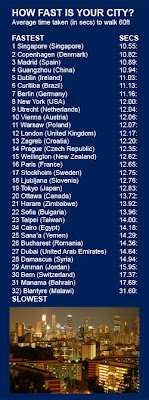Pace of Life
 Prof Richard Wiseman, author of Quirkology, has announced the results of an international study in collaboration with the British Council to measure the speed of life. The experiment was conducted by British Council researchers who secretly timed thousands of pedestrians’ speed of walking in city centres across the globe, including London, Madrid, Singapore, and New York.
Prof Richard Wiseman, author of Quirkology, has announced the results of an international study in collaboration with the British Council to measure the speed of life. The experiment was conducted by British Council researchers who secretly timed thousands of pedestrians’ speed of walking in city centres across the globe, including London, Madrid, Singapore, and New York.A study carried out in the early 1990s demonstrated that pedestrians’ speed of walking provides a reliable measure of the pace of life in a city, and that people in fast-moving cities are less likely to help others and have higher rates of coronary heart disease. Using identical methods to those employed in the previous work, the present day research teams discovered that the pace of life is now 10% faster than in the early 1990s. The biggest changes were found in the Far East, with the pace of life in Guangzhou (China) increasing by over 20%, and Singapore showing a 30% increase, resulting in it becoming the fastest moving city in the study.
Comments